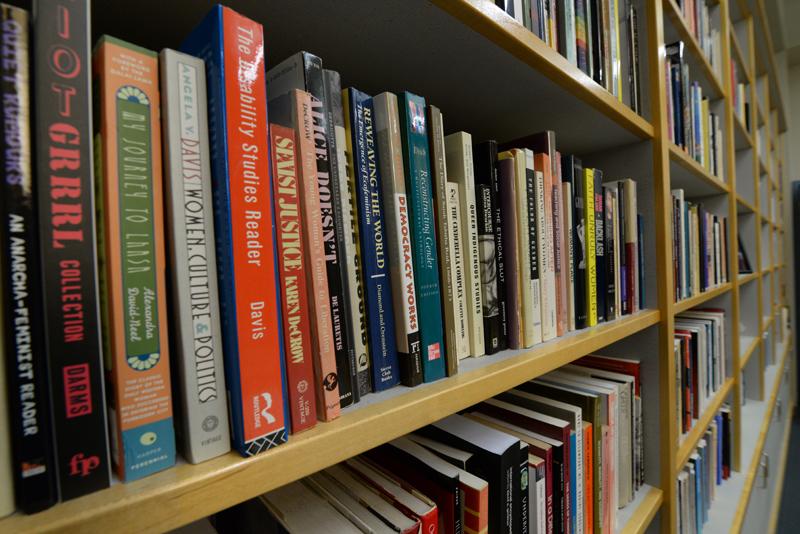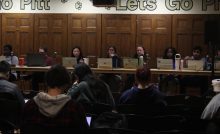GSWS: Flipping the pages of history


Jeff Ahearn | Assistant Visual Editor
On the fourth floor of the Cathedral of Learning sits a little-known collection of books that offers a snapshot of LGBTQIA history from the 20th century to the present.
The Gender, Sexuality and Women’s Studies’ library is a small room to the left of room 402 in the GSWS program’s offices in the Cathedral. The library holds about 1,000 books, journals and films that teach visitors about identity and social struggles that persist today.
The library developed alongside the GSWS program which began in the 1973-1974 academic year, and serves as a resource hub for students studying gender and sexuality. Previously, the program only offered a certificate in gender and women’s studies, until earlier this year when it began offering a GSWS major.
According to Irene Frieze, a professor at Pitt since 1972 who helped create the GSWS program, the library began forming unofficially while the program grew.
“The library was probably only a few shelves for the first decade,” Frieze said.
Senior Jessica Mermigos is getting a degree in Pitt’s new GSWS major, which the University unveiled this semester. She found the 1972 book “The Men with the Pink Triangle: The True Life-and-Death Story of Homosexuals in the Nazi Death Camps” by Heinz Heger in Pitt’s GSWS library tucked away on the fourth floor of the Cathedral.
Nazis arrested Heger in 1939 for his homosexuality, and placed him in a concentration camp where he remained until his liberation in 1945.“This book was the first I had ever come across that truly looked into the life of homosexuals in the concentration camps,” Mermigos said.
Karen Lillis, the GSWS program coordinator, said the library is important because it offers academic and anecdotal texts on society’s progress toward equality for all sexualities and genders.
“This room is a really special place to be because of the history, knowledge and passion of these books. It creates an intensity for me,” Lillis said. “This is a collection of items that chart where homosexuality has been in the late 20th century.”
Students who want to visit the library have to ask a staff member to unlock the door. It stays closed so students don’t use the room to sit and study in.
According to Lillis, the library now receives less traffic after the program moved from Wesley W. Posvar Hall to the Cathedral.
“Maybe because [the library] was so visible in the main office then,” Lillis said.
The room that houses the library also serves as a meeting room for the GSWS and Cultural Studies departments. The University holds discussions with visiting guests in the room, such as a September discussion with Moroccan LGBTQIA writer Abdellah Taïa on his autobiographical novel, “An Arab Melancholia.”
The room is also home to the special topics course, Affect Studies, Gender and Sexuality, this semester.
The Mallory Crawford Sex and Sexualities collection, which offers insight into perspectives on sexuality during the late 20th century, joined the GSWS library in 2014. The 162 books that make up the Mallory Crawford collection includes topics such as pulp fiction, psychoanalytic perspectives on sexuality and how to solve sexual problems through self-hypnosis, among others.
Mallory Crawford, the namesake of the collection, studied Spanish and philosophy at Barnard College, but spent the majority of her career working as a counselor and psychotherapist in West Hartford, Connecticut.
“She felt she provided a special kind of therapy,” Eleanor Barrett, Crawford’s sister said. “[There was] no particular name for it. She just characterized it as unique and intense enough that she considered 15 hours a week full time for her.” Barrett said she doesn’t think Crawford continued working in therapy when she moved to Pittsburgh.
In Pittsburgh, Crawford founded Earth Mother Enterprises, a non-profit committed to education for natural parenting.
Crawford, who was also a member of Mensa International — an international society for people whose IQ is in the top two percent of the world’s population — died last March at the age of 72. She lived in Mount Washington.
“I could tell immediately she was a lifer,” said Julie Beaulieu, a visiting lecturer at the GSWS program, who curated the collection. Beaulieu defines a lifer as, “Someone always clearly committed to thinking about sexuality in progressive, radical ways.”
Though the Mallory Crawford collection consists mostly of books centered on counseling within the LGBTQIA community, there are also groundbreaking fiction and non-fiction LGBTQIA novels within the collection.
One of these novels, “The Lord Won’t Mind” by Gordon Merrick, tells the story of two men who fell in love in the 1940s. In 1970, after the book’s publication, “The Lord Won’t Mind” stayed on the New York Times best seller list for 16 weeks.
The novel achieved long-lasting fame for being one of the first gay novels to not end in tragedy.
Merrick’s novel was not the only one to make a splash at the time of its publication. “Lesbian Nuns: Breaking Silence,” a collection of 51 interviews edited by Rosemary Curb and Nancy Manahan, became a landmark book after its publication in 1985. “Lesbian Nuns” focuses on the nuns trying to reconcile their sexuality with their religious devotion and vows.
The books, according to Lillis, exhibit not only the triumphs of the LGBTQIA community since the 20th century, but also the backlash the community has faced in the past.
“It would be really easy to forget all the wrinkles,” Lillis said.
For Beaulieu, the collection gives snapshots of perspectives on sexuality, proving that it is far from easy to attribute one viewpoint to a time period.
“When you go looking at these historical texts, it’s a mistake to say ‘U.S. culture thought this way then,’” she said.
The collection makes such a statement impossible because the books within the collection take different approaches to writing on sexuality, such as psychoanalysis, biblical perspectives and how myths shaped our understanding of sexuality.
“Someday, someone will look at what we say now on sexuality and say, ‘Wow, that’s weird,’” Beaulieu said.
Recent Posts
SGB addresses concerns about ICE presence on campus, hears SJP lawsuit against administration, approves governing code bill
At its weekly meeting on Tuesday at Nordy’s Place, Student Government Board heard concerns about…
ACLU of Pennsylvania sues Pitt over SJP suspension
The ACLU of Pennsylvania filed a federal civil lawsuit against the University of Pittsburgh and…
Marquan Pope: The ultimate shark
One of the most remarkable things about sharks is that an injury doesn’t deter them.…
Who Asked? // Do we really get a summer vacation?
This installment of Who Asked? by staff writer Brynn Murawski mourns the seemingly impossible perfect…
Notes From an Average Girl // Notes from my junior year
In this edition of Notes From an Average Girl, senior staff writer Madeline Milchman reflects…
Meaning at the Movies // The Power of the Movie Theater
In this edition of “Meaning at the Movies,” staff writer Lauren Deaton discusses her love…


